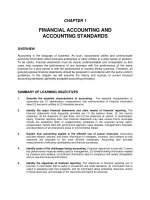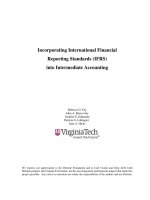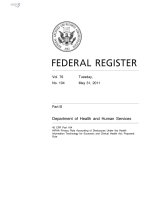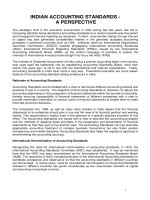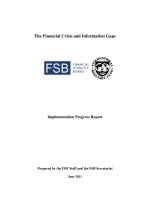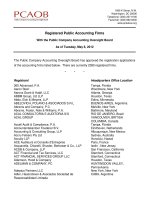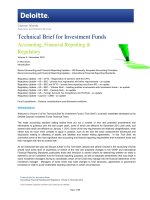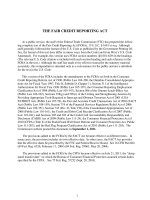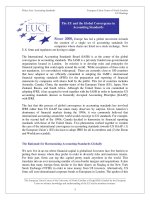THE FINANCIAL ACCOUNTING STANDARDS BOARD ACT potx
Bạn đang xem bản rút gọn của tài liệu. Xem và tải ngay bản đầy đủ của tài liệu tại đây (791.48 KB, 76 trang )
U
.
S
.
GOVERNMENT PRINTING OFFICE
WASHINGTON
:
For sale by the Superintendent of Documents, U.S. Government Printing Office
Internet: bookstore.gpo.gov Phone: toll free (866) 512–1800; DC area (202) 512–1800
Fax: (202) 512–2250 Mail: Stop SSOP, Washington, DC 20402–0001
80–682CC
2002
THE FINANCIAL ACCOUNTING
STANDARDS BOARD ACT
HEARING
BEFORE THE
SUBCOMMITTEE ON
COMMERCE, TRADE, AND CONSUMER PROTECTION
OF THE
COMMITTEE ON ENERGY AND
COMMERCE
HOUSE OF REPRESENTATIVES
ONE HUNDRED SEVENTH CONGRESS
SECOND SESSION
JUNE 26, 2002
Serial No. 107–109
Printed for the use of the Committee on Energy and Commerce
(
Available via the World Wide Web: />VerDate 0ct 09 2002 10:20 Oct 18, 2002 Jkt 081296 PO 00000 Frm 00001 Fmt 5011 Sfmt 5011 W:\DISC\80682 80682
COMMITTEE ON ENERGY AND COMMERCE
W.J. ‘‘BILLY’’ TAUZIN, Louisiana, Chairman
MICHAEL BILIRAKIS, Florida
JOE BARTON, Texas
FRED UPTON, Michigan
CLIFF STEARNS, Florida
PAUL E. GILLMOR, Ohio
JAMES C. GREENWOOD, Pennsylvania
CHRISTOPHER COX, California
NATHAN DEAL, Georgia
RICHARD BURR, North Carolina
ED WHITFIELD, Kentucky
GREG GANSKE, Iowa
CHARLIE NORWOOD, Georgia
BARBARA CUBIN, Wyoming
JOHN SHIMKUS, Illinois
HEATHER WILSON, New Mexico
JOHN B. SHADEGG, Arizona
CHARLES ‘‘CHIP’’ PICKERING, Mississippi
VITO FOSSELLA, New York
ROY BLUNT, Missouri
TOM DAVIS, Virginia
ED BRYANT, Tennessee
ROBERT L. EHRLICH, Jr., Maryland
STEVE BUYER, Indiana
GEORGE RADANOVICH, California
CHARLES F. BASS, New Hampshire
JOSEPH R. PITTS, Pennsylvania
MARY BONO, California
GREG WALDEN, Oregon
LEE TERRY, Nebraska
ERNIE FLETCHER, Kentucky
JOHN D. DINGELL, Michigan
HENRY A. WAXMAN, California
EDWARD J. MARKEY, Massachusetts
RALPH M. HALL, Texas
RICK BOUCHER, Virginia
EDOLPHUS TOWNS, New York
FRANK PALLONE, Jr., New Jersey
SHERROD BROWN, Ohio
BART GORDON, Tennessee
PETER DEUTSCH, Florida
BOBBY L. RUSH, Illinois
ANNA G. ESHOO, California
BART STUPAK, Michigan
ELIOT L. ENGEL, New York
TOM SAWYER, Ohio
ALBERT R. WYNN, Maryland
GENE GREEN, Texas
KAREN M
C
CARTHY, Missouri
TED STRICKLAND, Ohio
DIANA D
E
GETTE, Colorado
THOMAS M. BARRETT, Wisconsin
BILL LUTHER, Minnesota
LOIS CAPPS, California
MICHAEL F. DOYLE, Pennsylvania
CHRISTOPHER JOHN, Louisiana
JANE HARMAN, California
D
AVID
V. M
ARVENTANO
, Staff Director
J
AMES
D. B
ARNETTE
, General Counsel
R
EID
P.F. S
TUNTZ
, Minority Staff Director and Chief Counsel
S
UBCOMMITTEE ON
C
OMMERCE
, T
RADE
,
AND
C
ONSUMER
P
ROTECTION
CLIFF STEARNS, Florida, Chairman
FRED UPTON, Michigan
NATHAN DEAL, Georgia
Vice Chairman
ED WHITFIELD, Kentucky
BARBARA CUBIN, Wyoming
JOHN SHIMKUS, Illinois
JOHN B. SHADEGG, Arizona
ED BRYANT, Tennessee
GEORGE RADANOVICH, California
CHARLES F. BASS, New Hampshire
JOSEPH R. PITTS, Pennsylvania
MARY BONO, California
GREG WALDEN, Oregon
LEE TERRY, Nebraska
ERNIE FLETCHER, Kentucky
W.J. ‘‘BILLY’’ TAUZIN, Louisiana
(Ex Officio)
EDOLPHUS TOWNS, New York
DIANA D
E
GETTE, Colorado
LOIS CAPPS, California
MICHAEL F. DOYLE, Pennsylvania
CHRISTOPHER JOHN, Louisiana
JANE HARMAN, California
HENRY A. WAXMAN, California
EDWARD J. MARKEY, Massachusetts
BART GORDON, Tennessee
PETER DEUTSCH, Florida
BOBBY L. RUSH, Illinois
ANNA G. ESHOO, California
JOHN D. DINGELL, Michigan,
(Ex Officio)
(
II
)
VerDate 0ct 09 2002 10:20 Oct 18, 2002 Jkt 081296 PO 00000 Frm 00002 Fmt 0486 Sfmt 0486 W:\DISC\80682 80682
C O N T E N T S
Page
Testimony of:
Coffee, John C., Jr., Adolf A. Berle Professor of Law, Columbia University
Law School 46
Dharan, Bala G., CPA, J. Howard Creekmore Professor of Management,
Jesse H. Jones Graduate School of Management, Rice University 38
Jenkins, Edmund L., Chairman, Financial Accounting Standards Board 28
Lev, Baruch, Philips Bardes Professor of Accounting and Finance, De-
partment of Accounting Taxation and Business Law & Department
of Finance, Director, Vincent C. Ross Institute of Accounting Research,
Stern School of Business, NYU 54
Regan, Ned, President, Baruch College 57
(
III
)
VerDate 0ct 09 2002 10:20 Oct 18, 2002 Jkt 081296 PO 00000 Frm 00003 Fmt 0486 Sfmt 0486 W:\DISC\80682 80682
VerDate 0ct 09 2002 10:20 Oct 18, 2002 Jkt 081296 PO 00000 Frm 00004 Fmt 0486 Sfmt 0486 W:\DISC\80682 80682
(1)
THE FINANCIAL ACCOUNTING STANDARDS
BOARD ACT
WEDNESDAY, JUNE 26, 2002
H
OUSE OF
R
EPRESENTATIVES
,
C
OMMITTEE ON
E
NERGY AND
C
OMMERCE
,
S
UBCOMMITTEE ON
C
OMMERCE
, T
RADE
,
AND
C
ONSUMER
P
ROTECTION
,
Washington, DC.
The subcommittee met, pursuant to notice, at 10 a.m., in room
2123, Rayburn House Office Building, Hon. Cliff Stearns (chair-
man) presiding.
Members present: Representatives Stearns, Upton, Shimkus,
Bryant, Bass, Fletcher, Tauzin (ex officio), Towns, Markey, Eshoo,
and Dingell (ex officio).
Also present: Representatives Gillmor, Greenwood, and Luther.
Staff present: Brian McCullough, majority counsel; David
Cavicke, majority counsel; Ramsen Betfarhad, policy coordinator
and majority counsel; Shannon Vildostegui, majority counsel; Will
Carty, legislative clerk; and Consuela Washington, minority coun-
sel.
Mr. S
TEARNS
. Good morning, everybody. The Subcommittee on
Commerce, Trade, and Consumer Protection will come to order.
I want to thank personally all the distinguished witnesses for ap-
pearing before the subcommittee this morning. Of course all of us
look forward to your testimony.
The leading headlines in the financial press no longer speak of
the latest and greatest IPO offering, nor are the daily record highs
achieved in the leading stock markets. Instead, my colleagues, we
are confronted with a seemingly endless stream of bad financial
news about companies, big and small, that have manipulated the
public financial disclosures in their favor to the detriment of the
American investor.
‘‘Cooking the books’’ is not new in America’s history, but the fact
that major corporations engaged in such activity, and that no one
within or outside of government raised red flags when it mattered,
concerns us deeply.
I am a believer in the free market system. But in order for such
markets to work, they must be free of deceit and fraud.
We cannot legislate to prevent individuals from ignoring rules
and committing fraud. Those who are intent on doing so will vio-
late the rules. But what concerns me, and I suspect many of my
colleagues today, is that companies can comply fully with account-
ing rules and standards and yet completely distort their financial
performance.
VerDate 0ct 09 2002 10:20 Oct 18, 2002 Jkt 081296 PO 00000 Frm 00005 Fmt 6633 Sfmt 6633 W:\DISC\80682 80682
2
And yet another company, WorldCom, restates its earnings for
2001 by some $3.8 billion due to accounting irregularities. Enron
did so last year to the tune of $1.2 billion. In the committee’s inves-
tigation of Enron, we learned that several of the items that were
restated were the results of mistakes that violated existing ac-
counting standards on consolidation of special purpose entities.
We received testimony in our hearing in February, the SPE
served an important and valid purpose. Yet Enron’s restatement
exposed the reality that enormous amounts of financial obligations
and debt of a company can be removed from the balance sheet and
hidden from its investors through SPE’s under current accounting
standards.
We also discovered companies can use, and in some cases bend,
the existing financial accounting rules to give the appearance of
rapid revenue growth. Revenue recognition has been a controver-
sial issue for many years. But the degree to which similar trans-
actions can produce vastly different results according to the man-
ner in which they are accounted for can defy logic.
I understand that a model of, ‘‘one size fits all,’’ is not always ap-
propriate or accurate. But the problem of inconsistency appears to
be pervasive enough to warrant a serious and timely examination.
I emphasize timely, as a Financial Accounting Standards Board,
FASB, has been considering the revenue recognition issue for 26
years. In my view, 26 years is too long of a time to spend on any-
thing except, of course, raising your children.
It is no coincidence that investor confidence in both the markets
and the financial statements of the companies is very low, admits
to such uncertainty.
Until we can iron the wrinkles out of the current accounting sys-
tem, investors will remain hesitant to invest, and companies will
struggle to access needed capital.
A number of post-Enron reforms are working their way through
Congress. Administrative agencies, self regulatory organizations
and board rooms in most are a welcome improvement.
This subcommittee’s jurisdiction is over accounting standards
and the setting of those standards. In the draft legislation being
considered today, while we do not address the enforcement of ac-
counting rules, we have included certain underlying principles that
must guide the promulgation of accounting standards and with
which all specific accounting rules must be consistent.
These principles, we believe, are responsive to the inherent prob-
lems with today’s rule-based system of accounting standards that
many witnesses spoke to in our hearings in February.
It is our intent that adherence to those principles will bring
about greater transparency in and understandability of companies’
financial reports, diminishing opportunities for the obfuscation of
financial facts through manipulation of accounting standards.
Our goal with the draft legislation is to improve the financial ac-
counting system. It takes a very measured approach to addressing
issues that are of utmost importance to the long term health of our
economy.
The draft legislation primarily does three things. One, it gives
FASB standards Federal recognition.
VerDate 0ct 09 2002 10:20 Oct 18, 2002 Jkt 081296 PO 00000 Frm 00006 Fmt 6633 Sfmt 6633 W:\DISC\80682 80682
3
Two, requires FASB to promulgate a rule requiring accountants
to apply all FASB standards consistently with the fundamental
principles of transparency and understandability.
Three, directs FASB to promulgate rules in areas where current
standards need improvements, specifically off-balance sheet ac-
counting, revenue recognition, and market-to-market accounting.
One issue that is not addressed in the draft, but I wish to have
witnesses comment on, is, ‘‘funding independence for FASB.’’ I seek
unanimous consent to enter into the record a letter by Paul Volker
to me, where he states that, ‘‘it would be useful to find the means
for more assured financing in future years for both FASB and
IASB, the International Accounting Standards Board, free from
threats of withholding funds as a result of either businesses or po-
litical pressures.’’
By unanimous consent, I will put his letter in the record.
[The letter follows:]
VerDate 0ct 09 2002 10:20 Oct 18, 2002 Jkt 081296 PO 00000 Frm 00007 Fmt 6633 Sfmt 6602 W:\DISC\80682 80682
g:\graphics\80682.001
4
VerDate 0ct 09 2002 10:20 Oct 18, 2002 Jkt 081296 PO 00000 Frm 00008 Fmt 6633 Sfmt 6602 W:\DISC\80682 80682
g:\graphics\80682.002
5
VerDate 0ct 09 2002 10:20 Oct 18, 2002 Jkt 081296 PO 00000 Frm 00009 Fmt 6633 Sfmt 6602 W:\DISC\80682 80682
g:\graphics\80682.003
6
VerDate 0ct 09 2002 10:20 Oct 18, 2002 Jkt 081296 PO 00000 Frm 00010 Fmt 6633 Sfmt 6602 W:\DISC\80682 80682
g:\graphics\80682.004
7
VerDate 0ct 09 2002 10:20 Oct 18, 2002 Jkt 081296 PO 00000 Frm 00011 Fmt 6633 Sfmt 6602 W:\DISC\80682 80682
g:\graphics\80682.005
8
VerDate 0ct 09 2002 10:20 Oct 18, 2002 Jkt 081296 PO 00000 Frm 00012 Fmt 6633 Sfmt 6602 W:\DISC\80682 80682
g:\graphics\80682.006
9
VerDate 0ct 09 2002 10:20 Oct 18, 2002 Jkt 081296 PO 00000 Frm 00013 Fmt 6633 Sfmt 6602 W:\DISC\80682 80682
g:\graphics\80682.007
10
VerDate 0ct 09 2002 10:20 Oct 18, 2002 Jkt 081296 PO 00000 Frm 00014 Fmt 6633 Sfmt 6602 W:\DISC\80682 80682
g:\graphics\80682.008
11
VerDate 0ct 09 2002 10:20 Oct 18, 2002 Jkt 081296 PO 00000 Frm 00015 Fmt 6633 Sfmt 6602 W:\DISC\80682 80682
g:\graphics\80682.009
12
Mr. S
TEARNS
. My colleagues, although radical reforms could have
gained wide support a few months ago in the heat of the Enron in-
vestigation, we have chosen to add value where it is appropriate
and recognize the positive characteristics of the current system.
FASB is a private sector standard setter and has performed well,
given the enormity of its responsibilities. That said, I wish to per-
sonally thank Mr. Jenkins, the Chairman of the Financial Account-
ing Standards Board, for his service and his willingness to partici-
pate today.
For those who may not be aware, Mr. Jenkins’ term as Chairman
ends this week. He is gracious enough to accommodate us one last
time, and for that, I am grateful.
Mr. Jenkins has elevated the dialog with Congress to a level that
previously, in my opinion, did not exist. So I welcome the witnesses
today and I look forward to hearing their comments.
And with that the distinguished ranking member of the sub-
committee, Mr. Towns.
Mr. T
OWNS
. Thank you very much, Mr. Chairman. Let me thank
you also for holding this hearing.
Corporate fraud and accounting scandals have rocked investor
confidence in our capital markets and tarnished reputations in
board rooms, accounting firms, and on Wall Street.
The markets have sputtered along as headlines make clear
abuses thought to be unique to Enron are more widespread.
This committee conducted a bipartisan investigation into the
Enron scandal and identified three important areas of reform: No.
1, corporate governance, accounting governance and accounting
standards.
As far as corporate governance is concerned, the New York Stock
Exchange stepped up to the plate with significant changes to its
listing requirements.
The House recently passed a bill addressing some of the account-
ing governance issues. I think we will see more reform in this area
VerDate 0ct 09 2002 10:20 Oct 18, 2002 Jkt 081296 PO 00000 Frm 00016 Fmt 6633 Sfmt 6602 W:\DISC\80682 80682
g:\graphics\80682.010
13
when this issue goes to conference and this bill addresses the fol-
lowing component accounting standards.
I commend Chairman Stearns for his hard work on this issue
and for holding this important legislative hearing today.
For reform to be complete, we must address the critical account-
ing standards issues. The FASB Act does three main things. It rec-
ognizes FASB’s standards as authoritative; introduces a primary
accounting principle to improve transparency of financial reporting;
and requires FASB to revise accounting standards most abused by
Enron and Andersen.
It accomplishes this while maintaining FASB’s private sector sta-
tus as an independent, something this committee has always re-
spected.
I support the policies underlined in the FASB Act as Chairman
Stearns’ efforts to provide more transparency in financial reporting.
I thank the witnesses for their testimony today. I want to give
a special, special welcome to the New York connected members of
the panel. Of course, I look forward to the testimony from all the
witnesses, but especially those from New York.
Thank you very, very much.
Mr. S
TEARNS
. I thank my colleague.
Now the distinguished chairman of the Oversight Committee
that did the investigation of Enron, the gentleman from Pennsyl-
vania, Mr. Greenwood.
Mr. G
REENWOOD
. Thank you, Mr. Chairman.
I appreciate the opportunity to sit in as a non-member of this
subcommittee.
By now, we are all familiar with the story that led us here. On
December 2, 2001, Enron Corporation filed for protection from its
creditors under Chapter 11 of the bankruptcy laws. Two days later,
they laid off 4,000 employees.
By mid-December, what had once been the Nation’s largest en-
ergy supplier had been reduced to a penny stock and Enron em-
ployees and former employees, who had heavily invested in the
company’s stocks through their 401(k) retirement plans, saw most
of their life savings wiped out.
Outside investors, too, suffered heavy losses as nearly $70 billion
in assumed equity value simply vanished.
There were many disturbing features to the Enron debacle, but
as I noted at the time, few were as disturbing as what it might por-
tend for the future if left unaddressed.
For whatever else may be said of the meteoric rise and fall of
Enron, no one can claim that it went unobserved. On the contrary,
few corporations were more admired and few corporate cultures
were more extolled than Enron’s.
Yet all the while, Enron’s corporate team was busy ginning up
the numbers. As a result, millions of individuals, from the most so-
phisticated Wall Street mavens to the most innocent small town in-
vestors, were systematically being deceived.
What we did not know then is the number of other firms that
would so quickly follow in Enron’s wake: Tyco International,
Adelphia Communications, Global Crossings, and now ImClone.
VerDate 0ct 09 2002 10:20 Oct 18, 2002 Jkt 081296 PO 00000 Frm 00017 Fmt 6633 Sfmt 6602 W:\DISC\80682 80682
14
Nor was the public sector immune from this new accounting dis-
ease. Amtrak’s recent discovery that it had $200 million more in
losses than it had previously thought serves as an example.
But this morning’s news tops them all. WorldCom has announced
that it was guilty of a $3.8 billion accounting error.
To an increasing number of investors, the who’s who of American
corporate executives is beginning to look more and more like a
rogue’s gallery. I would hope that this morning’s revelations are
enough to convince even those who still cling to the belief that
these failures are merely aberrations, that they will not be quickly
remedied by the self-correcting mechanisms of the market alone.
Not even the street believes this any more.
As the writers at Fortune magazine wrote in their June 24 cover
story, ‘‘Phony earnings, inflated revenues, conflicted Wall Street
analysts, directors asleep at the switch, this isn’t just a few bad ap-
ples we are talking about here. Nearly every known check on cor-
porate behavior, moral regulatory, you name it, fell by the wayside,
replaced by the stupendous greed that marked the end of the bub-
ble and that has created a crisis of investor confidence the likes of
which has not been seen since the Great Depression.’’
In looking back at the more than 600 audited financial state-
ments of publicly traded companies that had to be recalculated
downwards in the past 3 years, it is increasingly clear, that Enron
was simply the most egregious example of the use of ledger domain
by corporate management teams in hiding the truth about a com-
pany’s actual financial health.
This committee and this Congress are now challenged with the
mission of developing remedies to the accounting and auditing
lapses so that in the future such occurrences are rare.
At the heart of this matter lies one document, the probity of
which is essential to the credibility of the entire securities and ex-
change industry: the annual audited financial report of a publicly
traded company.
The process by which this document is produced is central to this
committee’s role in developing new investor safeguards. That is
why I have joined with my colleague, Chairman Stearns, to intro-
duce legislation that would bring new vitality, a clearer mission,
and greater independence to the Financial Accounting Standards
Board, the body that sets the standards for auditing.
Our goal is straightforward. To be of genuine value corporate ac-
counting practices and standards must be transparent and fully
disclosed all the relevant facts needed by investors to acquire a
true understanding of a firm’s economic health.
While I am convinced that this is as much as this committee can
do, given the limits of our jurisdiction, I am also convinced that
this is not all that Congress needs to do. Bernard Baruch once ob-
served that when the market makes the front page, sell. I expect
there will be a great deal of selling in the coming days.
The success of market rests fundamentally on the ability of the
buyer to trust the seller. I am hard-pressed to believe that the true
trust relationship of the markets can be restored without signifi-
cant congressional action.
The core of that trust relationship is more than an honest ac-
counting, although that is an essential part. Sound corporate gov-
VerDate 0ct 09 2002 10:20 Oct 18, 2002 Jkt 081296 PO 00000 Frm 00018 Fmt 6633 Sfmt 6602 W:\DISC\80682 80682
15
ernance begins with corporate managers, extends to the board of
directors, and finally to the accountants who keep the company’s
books.
As Fortune magazine so plainly stated, ‘‘This market is suffering
from a systemic breakdown.’’
For that reason, I will shortly be introducing legislation to estab-
lish a market integrity commission, to examine and make rec-
ommendations to Congress and to the business community on what
reform measures are needed to improve the corporate governance
of our Nation’s publicly traded companies and to reestablish inves-
tor confidence in our markets.
For while I still hold that most of the reforms of our capital mar-
kets should be undertaken by the private sector, I also believe that
Congress has a responsibility, just as it did after the market crash
in 1929, to insist on the timely introduction of genuine reforms in
corporate governance to improve the way in which publicly traded
companies are governed, for shareholders and employees, and to
strengthen and safeguard our Nation’s economic health.
Thank you, Mr. Chairman.
Mr. S
TEARNS
. I thank my colleague.
The gentlelady from California, Ms. Eshoo.
Ms. E
SHOO
. Good morning, Mr. Chairman and members of the
committee, and welcome to distinguished panel.
Thank you for holding the hearing, Mr. Chairman.
In attempting to prepare for today’s hearing, it was difficult to
get our hands on what the language of the bill is and what exactly
is being proposed. As I understand it, the legislation will give
FASB standards a Federal recognition.
Of course, we would like to hear from the distinguished Chair-
man of FASB what that means and what kind of prescription this
is for what ails us.
It requires FASB to develop a rule requiring accountants to
apply all FASB standards consistently with the fundamental prin-
ciples of transparency and understandability. We are not doing any
of that now? And if we are, then how does this language apply?
How, again, is it going to be a prescription for what ails us?
It directs FASB to develop rules in areas where current stand-
ards need improvement, specifically off balance sheet accounting,
revenue recognition, and mark-to-market accounting.
I think that FASB needs to weigh in and explain forthwith how
much this is being accomplished today, where this takes us. Is it
strong enough?
My sense is that while the Congress has been, of course, on the
scandals beginning with Enron, that has really rocked our country,
it has shaken the confidence and I think the sense of decency that
the American people believe ultimately prevails.
I think, my sense, as of today, is that we are coming up short
on what we are to do. I want to be sure that what is being pro-
posed is the right dosage because we can decry what is going on.
An example in terms of energy, the House Energy and Commerce
Committee, to date, has still not weighed in on Enron and energy
suppliers and the abuses that have taken place that are docu-
mented by a Federal agency, the Federal Energy Regulatory Com-
mission.
VerDate 0ct 09 2002 10:20 Oct 18, 2002 Jkt 081296 PO 00000 Frm 00019 Fmt 6633 Sfmt 6602 W:\DISC\80682 80682
16
So I know the distinguished Chairman and others will weigh in
and that is what I would like to hear.
I would also like to weigh in on an issue that is related. And I
recognize that while Congress has the responsibility to address
these abuses, and I think that we have to come up with strong pre-
scriptions myself through sensible legislation.
There are some that are using the scandals, starting with Enron,
as a battle cry for what I believe are ill-conceived proposals like
changing the way stock options are valued. The financial fraud that
led to the collapse of Enron, in my view, had nothing to do with
stock options.
By proposing that stock options be counted as an expense against
corporate earnings or expensing them, as the phrase is used, Con-
gress, I think, is addressing the problem that does not exist with
a solution that does not work.
Financial reports will become less, not more accurate. There is
simply no way to accurately value the potential worth of employee
stock options. And if someone has a way of doing that, I would like
to hear them state it.
Unlike salaries, options are not cash transactions. To place a
value on them, companies would have to make predictions. Pre-
dictions. I think some of these predictions have gotten us into hot
water about the future price of stock, which employees will stay
with the company long enough to exercise their options, and who
would actually choose to do so, and at what price?
The second negative consequence I think is even worse. Faced
with the exorbitant cost of expensing options, most companies
would simply decide to stop offering them.
I think what is left out of this secondary debate that I am point-
ing to, Mr. Chairman, is the following. At the top of companies and
corporations, those at the top will always somehow do well. I think
we would all acknowledge that.
But I have seen over the 10 years—I can’t believe that I have
been here for 10 years, but this is my tenth year—I have seen the
rank and file employees win, and win well, under what I have just
described, their stake, their share in their company and their com-
pany’s future.
So perhaps this is going to be a part—I am sure it will be—part
of future debates, but I wanted to raise it. I think it is important.
I think we have to separate wheat from chaff. And I know that our
distinguished panel today, I hope and I trust that they will be
forthright with us.
We need solid direction on coming up with solid proposals, not
just political proposals, that the Congress can somehow go home
and say, we had hearings; we brought this up; and now this is
going to be fixed.
I am not an accountant. I guess I am glad that I am not today,
but they must be thought less of than, or running neck and neck,
I think, with politicians. But at any rate, I think you know my
point.
I really would like to know forthwith, without hurting anyone’s
feelings, if you think this is actually the strongest medicine that
really needs to apply. We have a huge infection in our system and
it needs to be cured.
VerDate 0ct 09 2002 10:20 Oct 18, 2002 Jkt 081296 PO 00000 Frm 00020 Fmt 6633 Sfmt 6602 W:\DISC\80682 80682
17
Thank you.
Mr. S
TEARNS
. I thank the gentlelady.
And now the distinguished chairman of the full committee, Mr.
Tauzin.
Chairman T
AUZIN
. Mr. Chairman, I really appreciate this hear-
ing and what I hope that we might be able to accomplish as a re-
sult of it and the hearings we have had on the abuses of both
Enron and Arthur Andersen.
The news this morning that another Arthur Andersen client,
WorldCom, has apparently played with the rules and with the con-
sent of their accountants in the field apparently misstated current
debt by trying to capitalize it over a longer period of time and in
the process overstated income, all to the detriment of investors,
who are entitled to get good information about companies, like
WorldCom and Enron, and others.
And again, we see a common thread here of an accounting firm,
that among the top five accounting firms in America, the only one
that apparently allowed its local auditors the power to overrule its
own quality review boards on the national level and, therefore, put
its own auditors in the field into the kind of vulnerable situation
where a strong and powerful corporate executive could, in fact, in-
fluence their decisions in bending the rules and reshaping the rules
to fit the corporate intent.
If what I read about WorldCom in the Post today is correct, this
fits the pattern, once again. And it calls upon us in our limited ju-
risdiction over FASB to do something basic about changing that
pattern.
I appreciate all of you coming today. The last time we had a ses-
sion with accounting professors, we learned that the basic thing
wrong with FASB, among all its problems, was that it was trying
to do like the IRS was doing. It was trying to write intricate rules
about what you could not do in accounting.
And so accounting firms, like Arthur Andersen, who allowed
their auditors to be less than fully independent, are vulnerable to
the pressures of a corporate executive who might want to do some-
thing improper, will love to find ways to get around the FASB
rules, to find out how what they did might not be prohibited by the
FASB rule.
We learned from the professors that it would be much wiser for
FASB to be placing strong, clear accounting principles out there
under which accountants must fit what they do in the field and
what they approve in corporate reporting of their assets and their
income and their debts.
I hope that we can agree upon legislation, again within our lim-
ited jurisdiction on FASB, that will force that result, get FASB to
do a better job of making sure that accounting firms from now on
find ways to comply with the rules rather than constantly be look-
ing for ways to get around a prohibition.
Second, I hope our legislation does something else. I would ap-
preciate all of you gentlemen commenting on the suggestion that
we give FASB a new authority; that we not only tell them to
change the way they do business, to make sure that this common
thread, if you will, of violations of accounting principles stops and
ends and then investors get better treated than they have been
VerDate 0ct 09 2002 10:20 Oct 18, 2002 Jkt 081296 PO 00000 Frm 00021 Fmt 6633 Sfmt 6602 W:\DISC\80682 80682
18
treated here, but that they also have a power to do something that
I think is critical and I would love for all of you to comment on it.
We have come to the conclusion that if FASB does not have the
power to do forensic audits. If they cannot from time to time do
what other rulemaking bodies do, and that is go into the field and
actually check to see whether their standards are being properly
applied, to see whether accounting firms are in fact following the
rules rather than trying to get around them; to see whether or not
their standards are up to date or whether they need to revise them.
Because in an information age, there are changes in the way you
look at assets and income and debt.
If they do not have the power to go in and check the performance
of their standards in the field from time to time, they will always
be behind the eight ball, always be late updating their rules, al-
ways be too slow, always be in a position where some smart ac-
countant and some bright executive are ahead of them doing some-
thing they should not be doing.
And that, I think, is one of the critical reforms I think we need
to make again within the limited jurisdiction we have on this issue.
I think it flows from all of what we have learned in the Enron
hearings up until this date.
So I know I have very limited time, but I would love if any of
you would—are we in question and answer period yet?
We are not.
Mr. S
TEARNS
. Just in opening statements.
Chairman T
AUZIN
. I would love if any of you, during the question
and answer period, would focus some attention on that central
question. Should we give FASB that authority? Without that au-
thority, can FASB do its job?
Let me make one final point because the paper talks about this
in a political sense as well. Anyone who believes in the capital mar-
kets, as we do, anyone who supports the notion of capitalism and
free markets and the business economy of this country, which has
been a leader in the world, anyone who supports the principles
under which free enterprise operates ought to be more offended by
corporate misbehavior than by anyone who does not.
And those of us who do are incredibly offended when we see cor-
porations run by people who put avarice ahead of the good of the
investors in the corporation. And all of us are offended when ac-
counting firms operate in a fashion that they allow independence
to go out the window and they permit the kind of simple and fun-
damental violations of the rules, as we have seen in the paper
today, where you would capitalize current charges just to inflate in-
come and hide debt and, therefore, hurt investors of your company
and hurt your company in the long run.
All of us are offended by that. And anybody who think that those
of us who support capitalism and support the free markets in this
country are less offended by it than anybody else is wrong. In fact,
perhaps more so.
It is like a member of your own family doing something wrong
instead of the neighbor. You get a little more upset about it. And
so I hope we disabuse that notion in this country. I think our hear-
ings on Enron, our hearings on Arthur Andersen, and I hope the
work we do in reforming FASB make that case over and over
VerDate 0ct 09 2002 10:20 Oct 18, 2002 Jkt 081296 PO 00000 Frm 00022 Fmt 6633 Sfmt 6602 W:\DISC\80682 80682
19
again. The Democrats and Republicans are equally offended by
what we have seen, and it has got to come to an end for the good
of the markets and for the good of investor confidence again, in this
economy if we are going to get it rolling again as we hope to get
it rolling.
Thank you, Mr. Chairman.
[The prepared statement of Hon. W.J. ‘‘Billy’’ Tauzin follows:]
P
REPARED
S
TATEMENT OF
H
ON
. W.J. ‘‘B
ILLY
’’ T
AUZIN
, C
HAIRMAN
, C
OMMITTEE ON
C
OMMERCE
One year ago, ‘‘transparent reporting and ‘‘auditor independence were not house-
hold phrases. Today they are. The Enron implosion ushered in a process in which
many Americans who previously paid little attention to the intricacies of accounting
became more concerned and more attentive to important, if nuanced, accounting
issues. Let me be clear—the behavior of Enron and Andersen was truly atrocious.
Yet the sunlight that has been shed on the deficiencies in our market system, much
of it by this Committee, will ultimately work to improve that system. As investors
digested the news about corporate managers helping themselves to shareholder as-
sets while the shareholder’s watchdogs looked the other way and Wall Street ana-
lysts continued to hype tanking stocks, they began to demand strong oversight of
the standards for recording and reporting public companies’ financial information.
This Committee held a series of hearings exposing the abuses at Enron and An-
dersen and exploring deficiencies in current accounting practices. In fact, some of
the same witnesses we heard from early in the process are here again today. I
thank them for returning. I also thank the rest of our panel for taking the time to
provide guidance on our accounting standards legislation. Chairman Stearns and
Chairman Greenwood have worked tirelessly to get to the root of the problems and
develop a viable solution and I thank them too, for all of their important efforts.
Our somewhat limited jurisdiction made meaningful reform of accounting stand-
ards in this committee alone difficult. We worked hard to fulfill our oversight obliga-
tions and help protect the investing public from the deficiencies in transparency and
comprehensibility of financial information.
That said, the Committee Print of the Financial Accounting Standards Board Act
makes important improvements to financial reporting. The bill introduces the bene-
fits of a principles-based accounting system into our rule-based system by requiring
FASB check the accounting standards against the principles of transparency and
comprehensibility. It also requires FASB to draft a primary standard that must be
used to ensure the application of accounting rules complies with those same prin-
ciples of transparency and comprehensibility. Any deviation in the application of a
rule from the principles articulated in the bill must be explained and justified. The
bill also requires FASB to finish work on accounting projects that have been ongoing
for too long. Those projects include work on revenue recognition, which I understand
has been under some consideration by FASB for 26 years, and off-balance sheet ac-
counting that has been open for more then ten years. The legislation also calls upon
FASB to complete it work on its fair value project.
Off ‘‘balance sheet accounting was subject to great abuse by Enron and all mem-
bers are united in the view that it is imperative to reform these rules.
The Committee has an obligation to exercise, not only its oversight jurisdiction,
but also its legislative jurisdiction in the area of accounting standards. The legisla-
tion we consider today will lead to improvements in the transparency of financial
information. Once again, I thank the witnesses for their testimony and assistance
and look forward to hearing what each has to say.
Mr. S
TEARNS
. I thank the chairman.
The distinguished ranking member of the full committee, Mr.
Dingell.
Mr. D
INGELL
. Mr. Chairman, I thank you for recognizing me.
I commend you for holding this hearing on legislation to improve
the accounting standards setting process. You, our Chairman, Mr.
Tauzin, Ranking Member Towns, and I all support the work of the
Financial Accounting Standards Board, FASB. And we care deeply
about its independence, which we think is necessary for a strong,
truthful, respected and trustworthy accounting industry.
VerDate 0ct 09 2002 10:20 Oct 18, 2002 Jkt 081296 PO 00000 Frm 00023 Fmt 6633 Sfmt 6602 W:\DISC\80682 80682
20
I, therefore, strongly support the goals of this committee print
and the bipartisan efforts to strengthen FASB.
The jurisdictional constraints that the House rules impose on
this committee—and we have jurisdiction over the FASB standard
setting process, but no jurisdiction over the central role of the Secu-
rities and Exchange Commission in development of standards and
its oversight of FASB—severely complicate the efforts of this com-
mittee to address the crucial implementation issues, such as those
identified in Professor Dharan’s excellent testimony.
I look forward to the testimony of all the witnesses this morning.
And I want you to know that I will try to work with them and you,
Mr. Chairman, and others on this committee to perfect and
strengthen this bill so it does what has to be done.
I and others have often said that Enron was not unique, that
there were other ticking time bombs out there. Subsequent events
have born that regrettable warning out. In the latest blow to our
economy and investor confidence in the stock market, we were met
this morning with news in the paper that says WorldCom’s audit
committee has uncovered what could be the largest accounting
fraud in history, the discovery that $3.8 billion in expenses was im-
properly booked as capital expenditures.
I would note that appears to be either an act of severe crimi-
nality or an event which, very frankly, could not have been com-
mitted by a beginning student of accounting.
I would note this committee should immediately commence a full
investigation, and I pledge my help in that work.
Chairman Levitt of the SEC warned loud and long about corrupt
financial management and their complicit auditors. His campaign
against earnings management, or falsifying revenue to boost stock
prices, was documented by Fortune magazine in such articles as
‘‘Presto Chango, Sales are Huge,’’ and ‘‘Lies, Damned Lies and
Earnings Management,’’ or perhaps it might have been just ‘‘Lies,
Damned Lies and Accounting.’’
In any event, very few people wanted to hear what he had to say
because they were too busy making too much money on the result-
ant run-up in stock prices. Regrettably, that party is over and we
all have a hangover. And we must all do our part to clean up this
sorry mess.
In April, the House passed a bill which could best be denomi-
nated as halfhearted or perhaps half-witted reform. As Business
Week warned in a June 3 editorial, ‘‘Halfhearted reform is bad for
the public, bad for the economy, and even bad for the accounting
industry, which needs to establish its credibility.’’ That is why it
is so important for the Congress to now take up and pass the Sar-
banes bill at the earliest opportunity.
FASB is not responsible for the wave of accounting scandals.
These companies and their auditors violated existing accounting
and auditing standards. Crooks are going to be with us always. We
must nonetheless look to see what we can do to enhance and
strengthen FASB and to improve the standard-setting process. I
stand ready to assist in that process.
I would just note one thing else. I have warned industry time
after time that this country has a most unique and wonderful asset
in our financial markets: they are trusted by the American people.
VerDate 0ct 09 2002 10:20 Oct 18, 2002 Jkt 081296 PO 00000 Frm 00024 Fmt 6633 Sfmt 6602 W:\DISC\80682 80682
21
I warned the financial industry of something else. Everybody
thought that this system ran on money. It does not. It runs on pub-
lic confidence. As long as the public has confidence, there will be
much money made by all.
I would just read one last point that shows that everybody has
a stake in this matter, and that is on page 1 of the Washington
Post. I would urge the reading of this article, ‘‘Corporate Scandals
Taking Toll On the Markets.’’ They are skimming a bunch of inno-
cent people in the marketplace, people who trusted corporate man-
agers, accountants, the Federal agencies to regulate, the Congress
to pass good laws and see that they are properly enforced. All of
the above have failed in a most noteworthy fashion. And until we
can straighten out this sorry mess and get people to have con-
fidence, we should not look to much confidence in the market, nor
should we look to the fact that good times are going to be here
again in the financial services industry.
I thank you, Mr. Chairman.
[The prepared statement of Hon. John D. Dingell follows:]
P
REPARED
S
TATEMENT OF
H
ON
. J
OHN
D. D
INGELL
,
A
R
EPRESENTATIVE IN
C
ONGRESS
FROM THE
S
TATE OF
M
ICHICAN
Mr. Chairman, I commend you for holding this important hearing on legislation
to improve the accounting standards-setting process. You, Chairman Tauzin, Rank-
ing Member Towns, and I all support the work of the Financial Accounting Stand-
ards Board (FASB) and care about its independence. I therefore strongly support the
goals of this committee print and bipartisan efforts to strengthen FASB.
The jurisdictional constraints that the House Rules impose on this Committee—
we have jurisdiction over FASB’s standard setting process but no jurisdiction over
the central role of the Securities and Exchange Commission in the development of
standards and its oversight of FASB—severely complicate our efforts to address crit-
ical implementation issues such as those identified in Professor Dharan’s testimony.
I look forward to the testimony of all of the witnesses this morning, and I will con-
tinue to work to perfect and strengthen this bill.
I and others have often said that Enron was not unique, that there were other
ticking time bombs out there. Subsequent events have borne that warning out. In
the latest blow to our economy and to investor confidence in the stock market, we
were met this morning with news that WorldCom Inc.’s audit committee has uncov-
ered what could be one of the largest accounting frauds in history, with the dis-
covery of $3.8 billion in expenses improperly booked as capital expenditures. This
Committee should immediately commence a full investigation, and I pledge my help
in that work.
SEC Chairman Arthur Levitt warned loud and long about corrupt corporate finan-
cial management and their complicit auditors. His campaign against earnings man-
agement or falsifying revenue to boost stock prices was documented by Fortune
magazine in such articles as ‘‘Presto Chango! Sales are Huge!’’ and ‘‘Lies, Damned
Lies, and Earnings Management.’’ Perhaps it should have been entitled ‘‘Lies,
Damned Lies, and Accounting.’’
Very few people, however, wanted to hear what he had to say because they were
too busy making too much money on the resultant runup in stock prices. That party
is over and we all have a hangover. We must do our part to clean up this sorry
mess. In April, the House passed halfhearted, some say half-witted, reform. As Busi-
ness Week warned in a June 3 editorial: ‘‘Halfhearted reform is bad for the public,
bad for the economy, and even bad for the accounting industry, which needs to rees-
tablish its credibility.’’ That is why it is so important for Congress to take up and
pass the Sarbanes bill at the earliest opportunity.
FASB is not responsible for the wave of accounting scandals. These companies
and their auditors violated existing accounting and auditing standards. Crooks will
always be with us. We must nonetheless look to what we can do to enhance and
strengthen FASB and improve its standard-setting process. I stand ready to assist
in that task.
I have warned time after time that the market is not driven by money, but rather
by public confidence. I would note an article on the front page of the Washington
Post today entitled, ‘‘Corporate Scandals Taking Toll On Markets’’ that details how
VerDate 0ct 09 2002 10:20 Oct 18, 2002 Jkt 081296 PO 00000 Frm 00025 Fmt 6633 Sfmt 6621 W:\DISC\80682 80682
